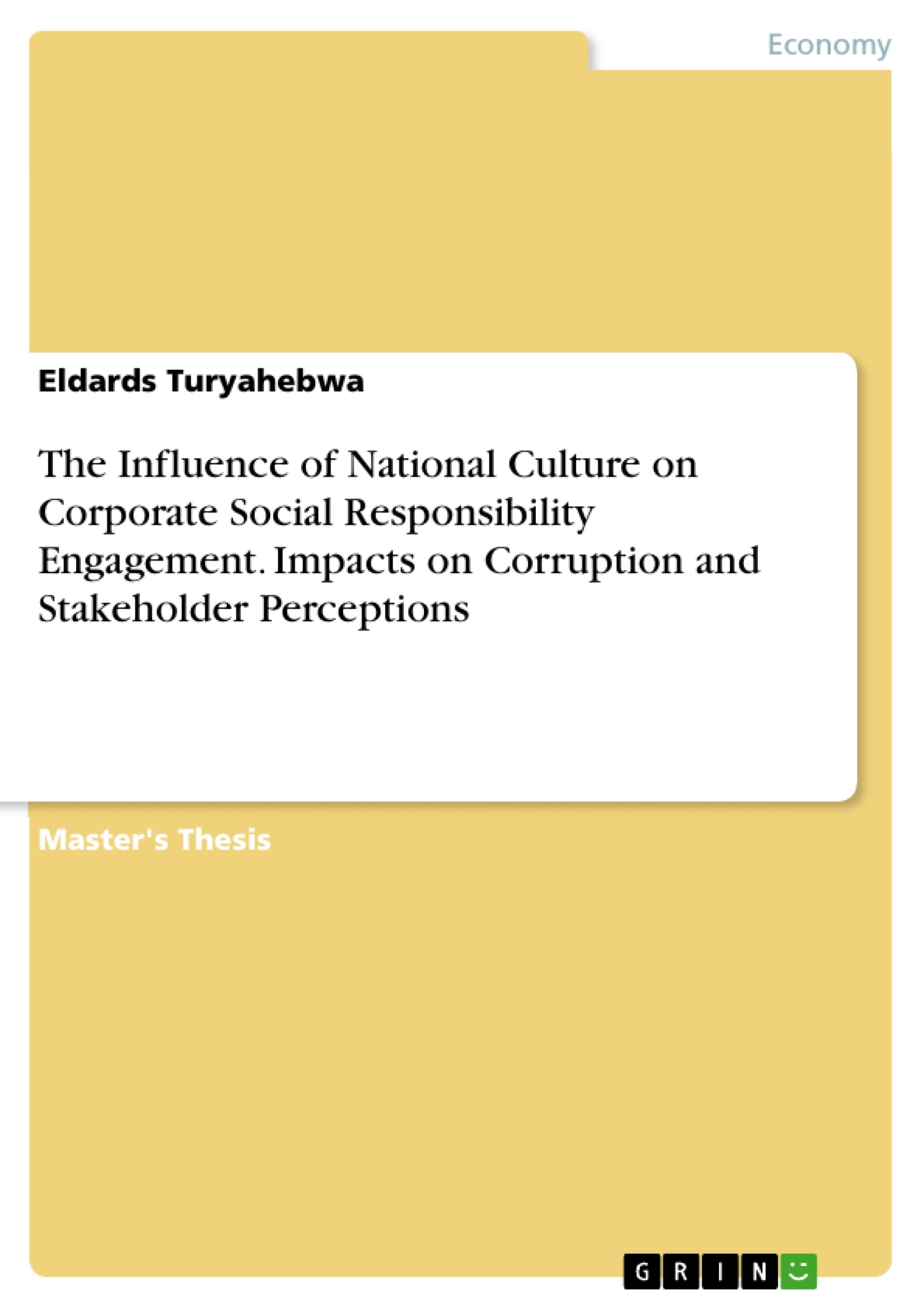The purpose of this study is to further the CSR (Corporate Social Responsibility) research agenda by bringing together multiple perspectives. It examines the influence of national culture on CSR and its impact on corruption. The study also needs to examine the relationship between culture and corruption and relatively evaluates individual stakeholder perceptions of CSR among insurance firms in Uganda.
This study sets out to investigate the influence of national culture on CSR engagement, the impact CSR has on corruption, as well as individual stakeholder perceptions of CSR among the selected insurance companies in Uganda. The study employs a mixed method approach, and it is guided by the following research questions: Does national culture influence CSR engagement among insurance companies in Uganda? To what extent does CSR positively or negatively impact on the levels and perceptions of corruption among insurance companies in Uganda? Does a firm’s CSR engagement influence stakeholders’ perception of its business practices and behaviours among insurance companies in Uganda?
During data collection, the study adopted a mixed methods approach. The validated 85 respondents (57%) of the questionnaire survey were the identifiable stakeholders. 5 Insurance companies and 3 regulatory and governance Insurance bodies were also considered for the study. Semi-structured interviews were used to gather detailed information, and to fulfil the intended purpose of this study.
Inhaltsverzeichnis (Table of Contents)
- CHAPTER ONE INTRODUCTION
- 1.0 Overview.
- 1.1 Context of the study
- 1.2 Statement of the problem
- 1.3 Purpose of the study.
- 1.4 Research Questions, Aims and Objectives
- Research Questions.......
- Research Aims
- Research Objectives....
- 1.5 Scope of the study
- Subject scope..
- Geographical scope.
- 1.6 Significance of the study.
- 1.7 Outline of the study
- CHAPTER TWO LITERATURE REVIEW.
- PART (A): CORPORATE SOCIAL RESPONSIBILITY AND THE INSURANCE INDUSTRY..
- 2.0 Introduction
- 2.1 Historical background, Definitions and Conceptualisation of CSR
- Historical background of CSR
- Definition and Conceptualisation of CSR..
- General definitions and Conceptualisation of CSR.……….....
- Adopted definition of CSR for this study
- Layers of CSR..
- Motivation/Drivers of CSR engagement.......
- Communicating CSR initiatives
- Benefits of engaging in CSR....
- Scepticisms of CSR...............
- Summary of key contributors to CSR
- 2.2 CSR and the Insurance Industry.
- CSR in the international industry.
- CSR in Uganda
- PART (B): NATIONAL CULTURE AND CORRUPTION.
- 2.3 National Culture...
- General perspectives and definitions of culture
- 2.3 National Culture...
- PART (A): CORPORATE SOCIAL RESPONSIBILITY AND THE INSURANCE INDUSTRY..
Zielsetzung und Themenschwerpunkte (Objectives and Key Themes)
This study aims to investigate the influence of national culture on Corporate Social Responsibility (CSR) engagement among insurance firms in Uganda, with a focus on its impact on corruption and stakeholder perceptions.
- The influence of national culture on CSR practices in the insurance sector of Uganda.
- The impact of CSR engagement on corruption within Ugandan insurance companies.
- Stakeholder perceptions of CSR activities and their understanding of the concept.
- The relationship between CSR communication and stakeholder perception.
- The extent to which insurance firms in Uganda prioritize transparency and stakeholder wishes in their CSR initiatives.
Zusammenfassung der Kapitel (Chapter Summaries)
- Chapter One: Introduction This chapter provides an overview of the study, outlining its context, problem statement, purpose, research questions, aims, objectives, scope, significance, and an outline of the structure.
- Chapter Two: Literature Review This chapter explores the existing literature on corporate social responsibility (CSR) and the insurance industry, with particular focus on the historical background, definitions, conceptualization, drivers, benefits, and criticisms of CSR. It also examines the relationship between national culture and corruption. This chapter aims to provide a theoretical foundation for the study and identify key themes and gaps in existing research.
Schlüsselwörter (Keywords)
Key words and concepts of this study include Corporate Social Responsibility (CSR), national culture, insurance industry, corruption, stakeholder perceptions, Uganda, mixed methods research, transparency, stakeholder engagement, and strategic philanthropy.
Frequently Asked Questions
How does national culture influence CSR in Uganda?
The study investigates how local cultural values shape the way insurance companies in Uganda engage with and implement Corporate Social Responsibility.
Can CSR engagement help reduce corruption?
The research explores whether transparent CSR practices can positively impact and potentially lower levels of corruption within the insurance sector.
What are the main drivers for CSR in the insurance industry?
Drivers include building brand reputation, meeting stakeholder expectations, and strategic philanthropy aimed at sustainable business practices.
How do stakeholders perceive CSR activities in Uganda?
Stakeholder perceptions vary; the study examines how well they understand CSR and if they view these initiatives as genuine or merely promotional.
Why is transparency important in CSR communication?
Transparency builds trust with stakeholders and ensures that CSR initiatives are seen as accountable and aligned with community needs.
What methodology was used in this study?
The study employed a mixed-methods approach, combining questionnaire surveys with semi-structured interviews for detailed data collection.
- Quote paper
- Eldards Turyahebwa (Author), 2017, The Influence of National Culture on Corporate Social Responsibility Engagement. Impacts on Corruption and Stakeholder Perceptions, Munich, GRIN Verlag, https://www.grin.com/document/501268



